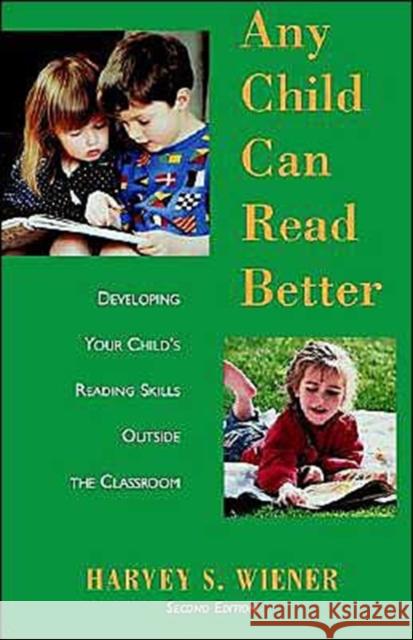Any Child Can Read Better: Developing Your Child's Reading Skills Outside the Classroom » książka
Any Child Can Read Better: Developing Your Child's Reading Skills Outside the Classroom
ISBN-13: 9780195102185 / Angielski / Miękka / 1996 / 288 str.
Reading, however fundamental the task may seem to everyday life, is a complex process that takes years to master. Yet, learning to read in the early stages is not an overwhelming problem for most children, especially when their classroom learning is coupled with a nurturing home environment in which reading is cherished, and pencil and paper are always available and fun to use. In fact, studies have shown that children score higher in reading if their parents support and encourage them at home. Unfortunately, though many parents want to involve themselves actively in their children's education, very few know just what to do. Now Dr. Harvey S. Wiener, author of the classic Any Child Can Write, provides an indispensable guide for parents who want to help their children enter the magic realm of words. In Any Child Can Read Better, Second Edition, Dr. Wiener offers practical advice on how to help children make their way through the maze of assignments and exercises related to classroom reading.
In this essential book, parents learn how to be "reading helpers" without replacing or superseding the teacher--by supporting a child's reading habits and sharing the pleasures of fiction, poetry, and prose. Home learning parents also will find a wealth of information here. Through comfortable conversation and enjoyable exercises that tap children's native abilities, parents can help their child practice the critical thinking and reading skills that guarantee success in the classroom and beyond. For example, Dr. Wiener explains how exercises such as prereading warm-ups like creating word maps (a visual scheme that represents words and ideas as shapes and connects them) will allow youngsters to create a visual format and context before they begin reading. He shows how pictures from a birthday party can be used to create patterns of meaning by arranging them chronologically to allow the party's "story" to emerge, or how they might by arranged by order of importance--a picture of Beth standing at the door waiting for her friends to arrive could be displayed first, Beth blowing out the birthday cake placed toward the middle of the arrangement, and the pictures of Beth opening her gifts, especially the skates she's been begging for all year, would surely go toward the end of the sequence. Dr. Wiener shows how these activities, and many others, such as writing games, categorizing toys or clothes or favorite foods, and reading journals, will help children draw meaning out of written material. This second edition includes a new chapter describing the benefits of encouraging children to keep a journal of their personal reactions to books, the value of writing in the books they own (underlining, writing in the margins, and making a personal index) and a variety of reading activities to help children interact with writers and their books. Dr. Wiener has also expanded and updated his fascinating discussion of recommended books for children of all ages, complete with plot summaries.
Written in simple, accessible prose, Any Child Can Read Better offers sensible advice for busy parents concerned with their children's education.











